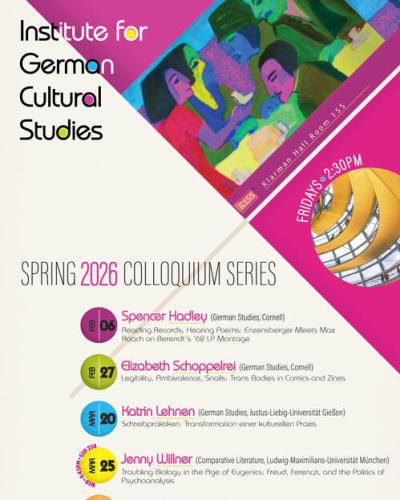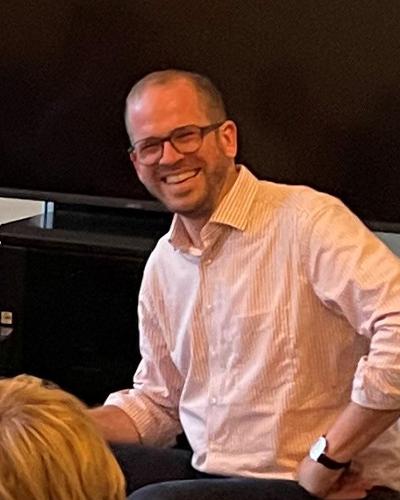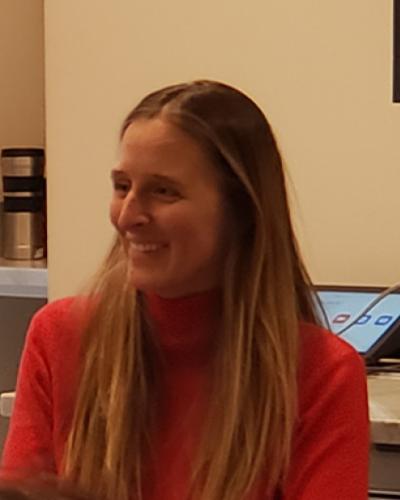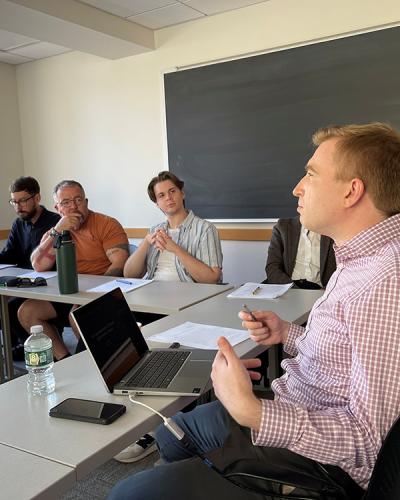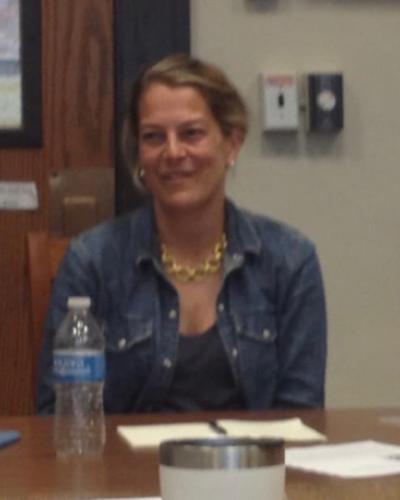Professor Bethany Wiggin (University of Pennsylvania) was invited to the German Department Colloquium on May 4st to discuss her paper “Liquid History and Floating Archives,” which developed from the work in her forthcoming book Utopia Found and Lost in Penn's Woods. While Wiggin originally conceived the book project to cover the years between 1610 and 1748, the colloquium paper instead highlighted the need to project her research questions into a much broader time frame, especially with respect to the construction of a historical archive. Beginning with a quote from Hans Blumenberg, Wiggin used his reversal of the term “terra firma” to show that firm ground is “increasingly hard to produce” and suggested the concept of a floating archive, which she defined as “a modest repository that might help us adequately represent the present and so consider a future in which we might not go under, a starting point for liquid histories.”
In order to demonstrate what floating archives might look like, Professor Wiggin pointed to three thematically and temporally distinct documents, which she suggested could be used as building blocks for a historical perspective that does not sit on stable ground. The first document was a text from a recent Sunday newspaper entitled “Shorebirds, the World's Greatest Travelers Face Extinction.” Wiggin interpreted Fitzpatrick and Senner's essay as a call for action: the decline of migratory shorebird populations and the vital loss of habitat at mid-migration stop-over sites since the 1950s proved that “the network of aquatic systems is fraying.'' The second document was a 1749 frontispiece for an almanac featuring Christoph Saur’s woodcut in the Hoch-Deutsch Americanische Calender. The woodcut pictured the Delaware River in Philadelphia, where the colonial settlers had landed a few decades earlier. This location marked one of the first environmental crisis recorded in the area, which, was caused by rapid population growth as a result of German and Scottish-Irish immigration. The third document was a photograph taken in 2017 of a sinking sculpture-barge, which was taken in the context of the Wet Land project. Wiggin was involved in the development of this installation artwork that featured a moveable, floating barge on Philadelphia’s Schuylkill River, which was used as a short-term artists' residency program between 2015 and 2017. The residency helped bring in artists who would reflect on the barge itself and its dynamic location through their work.
Attending to these documents Wiggin sought to frame our current time through the perspective of an increasingly ''liquid history.” “We need,” she argued, “to cultivate forms of scholarship and knowledge communities that rejects what Donna Haraway calls the God trick, a perspective that refuses to look down from a point of great elevation on our liquid histories, soggy presents, and watery futures.” For Wiggin this means that we must “consider our histories from an on-water perspective” and re-think notions of what terra firma represents.
The discussion raised the issue of perspective by asking what kinds of representations would be needed to portray the dynamic causality of liquid history and what metaphors might be most effective in this context. A collective mode of being was envisioned that connects to the post-humanist notion of species-being and offers a counterweight to individual modes of being. After all, we are all faced with the collective destiny of climate change and its catastrophes. (Sophia Léonard)

